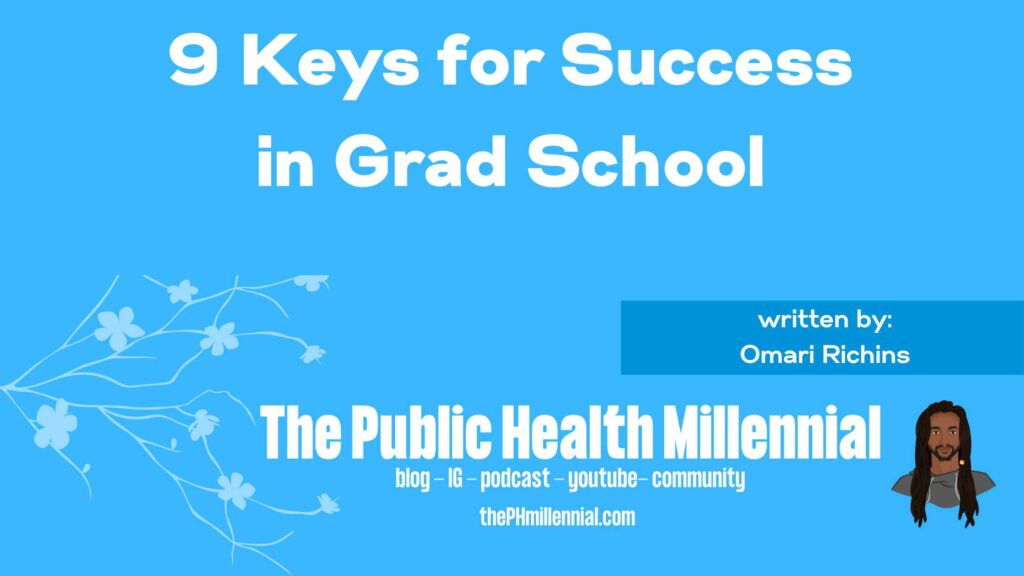So this is probably going to be among your biggest concerns during your graduate program. I know for me it was like “What’s the point of all this hard work and if I’m not going to be able to secure a job after I’m finished with grad school?”
(Unless you’re going on to do your PhD or another professional degree…)
It’s important to make the best of your grad school experience and develop the skills that will set you apart from the rest. If you think just getting good grades in your grad program is going to get you the job, better think again.
Don’t get me wrong you need to get good grades, but beyond that you need to develop the skills and experience that future employers are asking for.
Here are 4 steps to get a job after grad school:
- Start looking early
- Don’t just do well, go beyond
- Take on Opportunities (Build your resume)
- References
Support The Public Health Millennial on BuyMeACoffee
(Related: 9 Keys for Success in Grad School)

Start looking early
If you want your dream job, then you need to start looking early.
I started looking at jobs as early as June the year before I graduated. This really is a huge game changer that I don’t hear many people talking about. Getting a head start and knowing what job titles you would want to have after you graduate is key.
The first things you need to figure out is where you want to work and is there a market for your degree and skills in that location.
Knowing if there’s a market for your degree and the job titles you want, will save you the unfortunate luck of being somewhere where your degree does not get you a job.
So get on LinkedIn, Indeed, Glassdoor, Job alerts from Google, through your university job portal or a friend of a friend. Just start looking…you don’t have to start as early as July but you should have at least looked at several job openings before you start your final Fall semester in grad school.
Once you narrow in down to specific areas (cities/states), now you need to figure out what job titles you want. Different areas and companies have different job titles for very similar positions – I know it kinda sucks. You are going to have to read those job descriptions. Yes, read the entire job description – this can be very boring but trust me it will be worth it.
Here’s a quick way to look at job postings and get the good stuff even if you are just breezing through them.
- Name of the company and where its located
You are going to want to know the name of the company to know if that’s the only location or if they have other locations that you would potentially like to work at. Understanding the city your job is in is important, cause guess what, it’s where you are going to be living. Choose wisely.
- Education and/or experience (certifications needed if it applies)
This is a given, you are going to know if you are going to be graduating with the appropriate education (degree). Experience is going to tell you if you have enough of the appropriate work experience in the specific field – this one is going to be tough when you see 3-5+ years’ work experience needed. Understand that your internship and leadership experience can be finessed for work experience in certain cases.
- Knowledge, skills and abilities necessary
You need to know if you have acquired the right sets of knowledge. This can be through coursework, job/internship experience, leadership positions, attending conferences, research and/or through acquiring knowledge independently. Knowing what knowledge and skills are necessary allow you to know understand what you need to get from the remainder of your time as a student in grad school.
- Duties and responsibilities
This is going to give you a feel of the types of day-to-day duties you will be conducting. It will also tell you what types of workloads you will be responsible for. This can also be used to acquire knowledge of what types of internship positions you should try to get for the remainder of your grad school life. Working on similar sorts of projects (smaller in scope, of course) that future employers are working on during your internship experiences can be hugely beneficial.
- Salary and weekly hours required
Don’t get me wrong, salary and the number of required hours of work is vitally important. As you need to know how you’re going to eat and if you are going to have the work-life balance you’d like. Taking note of salaries can be beneficial for comparing companies, however not all job postings disclose this information unfortunately.
You are going to want to remember certain job titles and the job descriptions they represent to make it easier for you to search for these sorts of jobs when you are actually applying in the future. I highly recommend that you turn on job alerts for certain titles in locations you are interested in. This not only gets you a better understating of what cities have the jobs you want, but help you to understand the experience and skills you need to be a competitive candidate for that position.
Don’t just do well, go beyond
If you were like me, the two years of completing my graduate (MPH) program really flew by quickly. I was luckily able to secure a 1-year fellowship the March before I graduated in May. I excelled in my academics, but beyond that I made it my imperative to grab opportunities that were provided during my time at my program. And boy (or girl) did that help me.
If you’re reading this and in the public health field – it is huge field! There are many different opportunities for many different future aspirations. Maybe you plan to go to a professional school (medical school, dental school, law school, OT, etc.), further your education and get a PhD or something other than a job.
There are going to be various opportunities that arise during your master’s program for different areas of focus. You could be a Teacher Assistant, do research with a professor, hold a leadership position at a student organization, intern at so so many different organizations, volunteer, and so much more.
But you get what I’m saying: There are going to be lots of different opportunities you can pursue during your grad program.
Ensure whichever experiences you pursue during grad school, it improves the skills that job titles you are looking into are asking you to have once you graduate.
Here are 5 key competencies you will want to do or get during grad school:
- Leadership
- Conference
- Public Speaking
- Interpersonal skills/Teamwork
- Networking
You should know the list above is not exhaustive in important competencies you can acquire but surely will be important in the longevity of your professional career. It is important that during grad school you are able to not only achieve good grades but are able to embrace many opportunities.
Just remember after you secure your first job, it’ll make it easier to secure future ones. So put in the work now to make it easier for yourself in the future.
Take on Opportunities (Build your resume)
There are going to be lots of opportunities thrown at you throughout grad school. In order to succeed in getting the job that you want after graduate school; you must clarify and do research as to what are the duties and responsibilities of that position.
After you know the duties and responsibilities of the type of jobs you want, it will make it exponentially easier to decide what opportunities you should try to seek out during your grad program.
For example, during my internship I worked on several parts of different Community Health Needs Assessments and this was a huge factor in getting my fellowship after graduating – as this is the main project I am working on at my fellowship currently.
When thinking about skills and experiences you want to get during your grad program – you must always think about how it will transfer onto your written resume.
In my opinion the most beneficial transferable skill you can acquire during grad school will be leadership. In your opportunities you take try to find to ones where you can gain leadership experience. Whether is through being on an executive board or just speaking up and leading in different group settings – ensure you gain this skill.
You should have a bare minimum of 6 months of internship experience before graduating.
This must be internship experience where you are building on skills that you will need for your professional career after grad school. Why would someone be interested in hiring you if you have a great GPA but zero internship/work experience? It just won’t add up to them as they will be many other graduates who would have acquired the relevant experience along with great GPAs.
I would recommend that you get a full year of internship or work experience by about half-way through your final semester.
This will be beneficial for two reasons: 1) a lot of jobs ask for at least 1 year of experience; 2) it will allow you a lot of time to be able to work on several different projects that can be relevant to several job positions.
Ensure that your resume is unique and catered specifically to the different jobs you apply to. Though this might be a little time consuming, the value it adds to have you reflect the experiences and skills that fit with that job role will pay off in the long-run.
Your resume should be 1-page. Unless you actually have enough substantive information for a 2-page resume. What is substantive information you ask? Well it’s not experiences from high school, lower-class years of undergraduate or those one-time occasions.
Focus on experiences that you could actually have a good conversation about in an interview and how it has impacted you, allowed you to find your passion, or taught you something worthwhile. I always liked to add a little something different – thus I added the half marathon I’ve done as an accomplishment. And surely, it was stroked up in conversation while going through the interview process for my current fellowship.
There are going to be thousands of other graduates along with other professionals who will be interested in the same jobs that you are. So you must ensure to build on skills that future employers are asking for while being able to display it in resume form for future jobs.
References
Oh yes, you knew this was coming. Though every job after grad school will not need you to have references. Fact of the matter is that the majority of them will require 2-3 references. And even if your first job doesn’t require this, your second job just afterwards just might.
FYI references can be a letter of recommendation and/or references that future employers call to verify your information/experiences and character.
For me I applied to several Health Administration fellowships, jobs and the Community Health Fellowship I currently work at. ALL of the ‘jobs’ I applied to required that I have 3 references.
I would absolutely say that having high quality references that can actually speak to your abilities can be the difference between you and the other candidate getting the job.
One of the most overlooked aspects of getting the job you need is going to be getting references that can speak positively to your various strengths and experiences. In order to get these high quality references from individuals you need to start making those connections early on.
This could be speaking up in class, going to professors’ office hours, doing research with a professor, building a relationship with you preceptor/supervisor at your job or internship, or working in leadership positions with mentors.
I think the one person that you should try to get as a reference, although this may be hard, is going to be the director of your graduate program. This not only looks good to the employer, but the director of your program is going to want to speak highly of you since your success is reflective of their graduate program’s success.
I was lucky enough to work directly with my graduate school director as I held the president position for my graduate programs student association – the Public Health Student Association.
Through these interactions I was able to develop a relationship where the director knew what my goals were and supported me to achieve them.
Additionally, I chose my other reference as the CEO of the organization I worked/interned at who was my professor for two classes during my grad school. This allowed him to speak not only on my professional experience but also my academic experience. And my third reference was my immediate supervisor in the same organization I worked/interned with – she was able to talk more about the work I’ve done, my professional aptitude and my character.
I would say it is always advantageous to have the graduate program director (given there are available) as a reference.
Then you should have someone who can speak to your academic/research experience. Lastly, you should have someone who can speak about the most influential work experience on your resume while also talking about your work ethic and professional outlook.
One thing you must keep in mind when getting a reference – is to ensure that they are aware that you will be using them as a reference. If you can give them more information on what position you are applying for and send them a copy of your personal statement and resume you used for this job would make their jobs tremendously easier.
I you are getting a letter of recommendation – you must ensure that you let your recommender know a couple months before it is due as people tend to be busy and writing a letter of recommendation is not an easy task. I would recommend that you sit down and talk to your recommender so that they are able to highlight the sorts of experiences you have that will set you apart from the pack when applying.
Sometimes your recommender will want you to basically write your own letter of recommendation and then they will make adjustments.
To get a job after grad school, you will need to have references lined up to speak on your behalf for the skills, experiences and character you possess. Once you are able to make good impressions and build professional relationships with your professors/mentors/employers/preceptors this will lend itself to them helping you to be a high-quality reference.
Special tip:
Make sure to take advantage of your schools’ resources. I was able to attend several graduate program professional development opportunities that none of my other peers took advantage of.
Conclusions
Success in grad school does not always equate to getting a job after grad school. Be sure to take advantage of these tips to take your best step forward for getting a job after grad school.
(Read my article about 9 Keys for Success in Grad School)
- Start looking early
Looking early gives you a head-start against the competition and allows you to know what skills and experiences you need to acquire to get the job you want after graduate school.
- Don’t just do well, go beyond
Most people during their graduate school program do well academically. Academics alone will not set you apart so make sure to take advantage of all the wonderful opportunities to develop the skills and acquire the knowledge to get the job you want.
- Take on opportunities (build your resume)
Choose experiences that will complement the knowledge you are acquiring during your program. Ensure you articulate your experiences in a way that gets employers excited to get to know about you and the work you’ve done.
- References
Whether getting a job after graduate school or some other professional degree, good references can help sway tough hiring decision in your way. Ensure to make genuine connections with influential persons you can ask to be a reference for you.
What do you think is the biggest challenge when applying for a job after graduate school?



